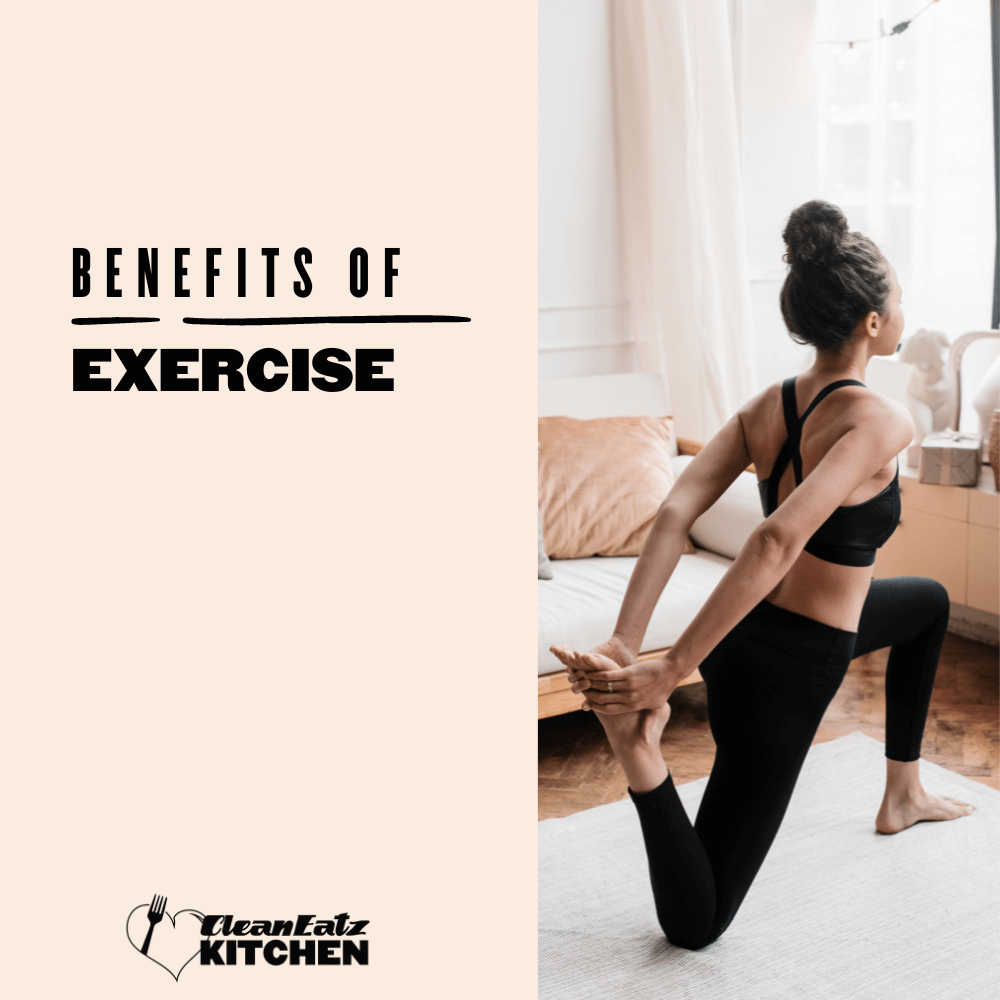
What Are The Benefits of Exercise?
Jason Nista
Exercises & Fitness
|
Weight Loss
|
Mental Health
|
Sleep
11 minute read
Table of Contents
If you've spent a fair amount of time researching the massive world of exercise and fitness, then you must have a general idea of what are the benefits of exercise and how regular exercise is essential for you. However, in order to keep you motivated, you need to have a much deeper understanding of the various benefits that a consistent exercise plan can have for your health. We're here to help you acknowledge just that by enlisting the various benefits of exercise that you'll begin to notice soon.
Why is Exercising Important?
Why is exercising important? It's more than just going to the gym or running on a treadmill. Find out what exercise really means!
Exercise has many different definitions, depending on who you ask. Some people think that exercise is only physical activity, while others include things like meditation, yoga, and even gardening. Fortunately, no matter what physical activity you choose to include in your daily routine, they all have benefits. Staying active helps keep your body in shape and boosts your overall well-being. It can help prevent disease and significantly increase your lifespan.
There are many benefits that a regular exercise routine can provide for us:
- Exercise helps keep us healthy by burning calories and building muscle.
- Exercise improves our mood and reduces stress.
- Exercise helps us sleep better at night.
- Exercise boosts our brainpower and supports our memory.
- Exercise makes us feel good about ourselves by giving us a boost of self-confidence.
- Exercise keeps us active and prevents us from becoming stiff and painful.
- Exercise strengthens our immune system and helps us fight off illness and disease.
- Exercise helps us live longer.
- And finally, exercise is fun!
Physical activity has been shown to improve mood, reduce stress, boost energy levels, and help with sleep. In addition, regular exercise reduces the risk of cardiovascular diseases, type 2 diabetes, osteoporosis, certain cancers, obesity, and other illnesses.
The American College of Sports Medicine defines exercise as "any bodily movement produced by skeletal muscles that result in energy expenditure." Anything from walking to running to lifting weights counts as exercise. Even working in the garden or playing with the kids are great ways to stay physically active and help keep you in shape.
Exercise Boosts Your Mood
So what are the benefits of exercise? Various individuals consider exercise to be an escape from the outside world as it helps them get their minds off things. Exercise releases endorphins, which are hormones that make us feel good. Not only will you feel better physically, but you'll also feel better mentally.
When you're feeling down, it can be tough to get started on your exercise routine. But just think about how good you'll feel once you've finished. And once you see how good regular exercise makes you feel, it'll be that much easier to stick with it in the long run.
Exercise Reduces the Risk of Chronic Disease
A major reason for chronic diseases in aging individuals is a lack of physical activity. Therefore, regularly exercising is a great way of getting your body the ideal amount of physical activity that it needs to reduce the risk of getting a chronic disease in the long run.
Exercise has been shown to reduce the risk of chronic disease, including heart disease, stroke, type 2 diabetes, and cancer. Plus, it's been linked with better mental health overall. So not only will you look and feel better when you exercise regularly, but you'll also be doing your body a world of good.
Exercise Leads to Better Sleep
Are you having trouble sleeping lately? Getting some physical activity during the day can help you sleep better and longer at night, which can improve your overall well-being.
Physical activity boosts serotonin production, which is a hormone that helps regulate sleep and wake cycles. Moreover, regular exercise also increases your body temperature and when it drops, it signals to your brain that it is time to sleep.
Additionally, getting in a workout means that your body is ready for rest when the time comes—you’ll have burned off the energy that would usually keep you awake or make it hard to fall asleep. So if you're having insomnia issues, try squeezing in some daily workouts and you’ll begin to experience significant results in the form of better sleep cycles.
Exercise Builds Strong Muscles and Bones
Regular exercise can do more than just improve your physical fitness—it can also improve your bone and muscle strength. During physical activity, your body is forced to work harder, which in turn stimulates the production of hormones that enhance bone and muscle thickness.
As a result, stronger bones and muscles begin to develop over time. Not only does this mean better posture and less risk of injury, but as we age it can help prevent the risk of osteoporosis. That's why it's important to stick to a regular exercise routine for the better part of your life.
Studies have shown that the best way to do this is through weight-bearing exercises such as running, weight lifting, or resistance training. As you increase the intensity of the exercise, your bone density increases as well, making them even stronger and more resilient.
Exercise Helps You Manage Stress
Are you feeling stressed out on a daily basis? Exercise can help with that. Regular physical activity can actually make your body better at coping with stress and other mental health issues. When you work out, your body releases mood-boosting endorphins, which can reduce stress and bring about an improved sense of well-being.
Plus, exercising helps strengthen the connection between the mind and the body by offering a distraction from whatever is causing you stress in the first place. In fact, according to Harvard Health Publishing, studies have shown that regular exercise offers protection against anxiety and depression compared to people who don't exercise regularly.
Tips for Getting Started
If you're new to exercise, it can be overwhelming, and you may not know where to start. Fortunately, one of the best ways to integrate an exercise routine is to start slowly. Taking a 10-minute brisk walk after dinner a few times per week will get your body moving and limber up your joints. As you get used to this, you increase both your duration and intensity. Find activities that you enjoy doing and incorporate them into your day as often as possible. The more you move, the more calories you will burn and the greater the results you will see.
How can I stay motivated?
One of the biggest challenges that many people face is staying motivated. Motivation is a key factor in losing weight and staying healthy. You have to have the dedication and drive to be able to start an exercise routine and stick with it. Here are some easy tips you can try to harness your inner power and stay motivated to reach your goals no matter what comes your way:
Tips to take control of your motivation:
Know your reason why
You need to have a reason for wanting to stay active and get fit. No matter what that reason is, you need to commit it to memory. Whenever you feel like your resolve is fading, you need to remember why you want to get in shape and stick to your goals.
Make it fun
You need to find a way to make working out fun for you. Whether that means choosing an exciting activity like dancing or enlisting the support of a good friend, the more fun you have, the more likely you will be to stick to any workout routine. So buy some new workout clothes, download a fun playlist and call your bestie to join you. Whatever you do, just aim to have fun!
Set a routine
When it comes to staying motivated, having a set routine is extremely important. If we wake up in the morning without a plan and have to think about what we will do that day, there is a good chance that we may push aside our biggest goals to do what is easiest. Before you go to bed each night, make a quick schedule for the next day, and be sure to schedule some time for physical activity. You may need to get up a few minutes earlier to accomplish everything, but it will all be worth it in the long run!
Track your progress
Nothing will give you a boost of motivation like seeing just how far you have come. When you can see solid improvements and your end goal is in sight, your motivation will sky-rocket! Before you begin your exercise journey, take all of your measurements and write them down. Record your starting weight, your body fat percentage, and all of your measurements. Don't forget to take pictures too. All of this will help you gauge just how far you have come and how much all of your hard work has paid off.
Reward yourself
Treating yourself after completing milestones along the way is a great way to keep you pushing hard to get to your final goal. After the first week of staying strong, reward yourself with a new set of workout clothes; after the third week, buy yourself a new pair of running shoes or that fancy set of Bluetooth headphones you've been looking at. Small incentives along the way will keep you pumped and on track.
Final Thoughts
The bottom line is that regular exercise has tons of benefits, from improving your mood to reducing your risk of disease. However, you need to remember that consistency is key if you wish to acquire the various benefits of regular exercise listed above.
Exercise boosts your mood with the release of endorphins. Regular physical activity reduces your risk of chronic disease. Exercise boosts serotonin production, which leads to a better quality of sleep. It stimulates the production of hormones that enhance bone and muscle thickness. Regular exercise helps you cope with stress and other mental health issues.
Furthermore, if you want more efficient results, then you’re highly recommended to follow a proper diet plan that increases the effectiveness of your workout plan. Clean Eatz Kitchen has come to your aid with a variety of diet plans that will keep your body energized and ready to hustle during every workout session.
FAQ
How much exercise do I need to see benefits?
The amount of exercise required depends on your goals and current fitness level. The American Heart Association recommends at least 150 minutes of moderate-intensity aerobic exercise or 75 minutes of vigorous-intensity exercise per week, along with muscle-strengthening activities on two or more days a week.
Can exercise help prevent chronic diseases?
Yes, regular exercise can significantly reduce the risk of chronic diseases such as type 2 diabetes, osteoporosis, certain cancers, and heart disease. It also plays a crucial role in managing existing conditions.
Is it essential to engage in a specific type of exercise to reap the benefits?
No, the type of exercise you choose depends on your preferences and goals. Aerobic activities like walking, jogging, or cycling are excellent for cardiovascular health, while strength training and flexibility exercises offer different benefits. The key is finding activities you enjoy and can sustain.
Are there any age restrictions for experiencing the benefits of exercise?
Exercise is beneficial at any age. Children, adults, and seniors can all enjoy the advantages of regular physical activity. It's essential to tailor exercise routines to individual abilities and consult a healthcare professional when necessary.
Related Articles
Is Cycling Good for Weight Loss?
6 minute read
Is Shrimp Good for Weight Loss?
6 minute read
Is Peanut Butter Good For Weight Loss?
8 minute read



